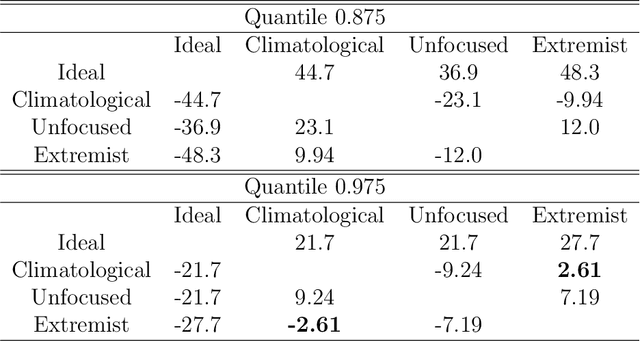Anne-Laure Fougères
PSPM
Extreme events evaluation using CRPS distributions
May 10, 2019



Abstract:Verification of ensemble forecasts for extreme events remains a challenging question. The general public as well as the media naturely pay particular attention on extreme events and conclude about the global predictive performance of ensembles, which are often unskillful when they are needed. Ashing classical verification tools to focus on such events can lead to unexpected behaviors. To square up these effects, thresholded and weighted scoring rules have been developed. Most of them use derivations of the Continuous Ranked Probability Score (CRPS). However, some properties of the CRPS for extreme events generate undesirable effects on the quality of verification. Using theoretical arguments and simulation examples, we illustrate some pitfalls of conventional verification tools and propose a different direction to assess ensemble forecasts using extreme value theory, considering proper scores as random variables.
Forest-based methods and ensemble model output statistics for rainfall ensemble forecasting
Nov 29, 2017



Abstract:Rainfall ensemble forecasts have to be skillful for both low precipitation and extreme events. We present statistical post-processing methods based on Quantile Regression Forests (QRF) and Gradient Forests (GF) with a parametric extension for heavy-tailed distributions. Our goal is to improve ensemble quality for all types of precipitation events, heavy-tailed included, subject to a good overall performance. Our hybrid proposed methods are applied to daily 51-h forecasts of 6-h accumulated precipitation from 2012 to 2015 over France using the M{\'e}t{\'e}o-France ensemble prediction system called PEARP. They provide calibrated pre-dictive distributions and compete favourably with state-of-the-art methods like Analogs method or Ensemble Model Output Statistics. In particular, hybrid forest-based procedures appear to bring an added value to the forecast of heavy rainfall.
 Add to Chrome
Add to Chrome Add to Firefox
Add to Firefox Add to Edge
Add to Edge